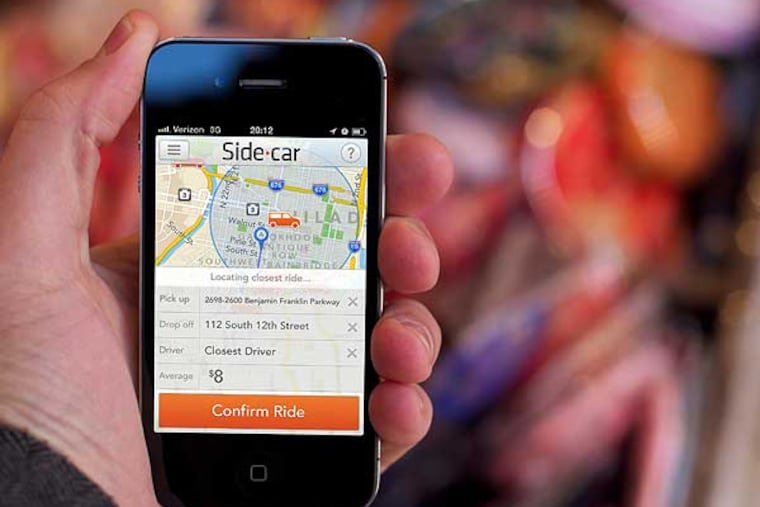Parking Authority halts 'gypsy' cab service
A "ride-sharing" operation that offered on-demand trips in private cars was shut down Saturday by the Philadelphia Parking Authority for running an illegal taxi service.

A "ride-sharing" operation that offered on-demand trips in private cars was shut down Saturday by the Philadelphia Parking Authority for running an illegal taxi service.
But the founder of SideCar, a San Francisco-based venture that got $10 million last year from Google and other investors, said Tuesday the service will be back in business in Philadelphia on Friday.
Three local men driving for SideCar were given $1,000 citations (one twice) and had their cars impounded, Jim Nye, director of PPA's taxi and limousine division, said Tuesday.
The three were identified as Sunil Kumar Patel, of Wallingford; James Anthony Fields, of Drexel Hill, and Gary Lewis Dempsey of Philadelphia.
SideCar was also fined $3,000 for operating taxis without proper certification, PPA general counsel Dennis Weldon said.
SideCar offers rides on demand, through a smart-phone application. Riders request a car, indicating location and destination, and a private driver responds in a private car.
The transaction is paid for with a "donation," and SideCar recommends an amount. Drivers make up to $22 an hour, according to SideCar's website (www.side.cr/).
SideCar founder Sunil Paul declined to say how many drivers are signed up in Philadelphia, though he said it is "less than 100 and more than three."
SideCar claims the operation is "like a quick and hassle-free carpool," that is "completely donation-based."
Taxi and limousine regulators see it differently.
"It's basically a hack through an app," said Weldon. "It's a tremendous public safety problem...you have no criminal background check, no proof of insurance. You don't know if the driver even has a license."
"Something bad is going to happen, and people will say, 'how did you let this happen?'"
Philadelphia cabs must have a taxi medallion, which currently sell for $450,000 each, and owners must pay an annual $1,250 assessment per vehicle. Drivers must pay $115, undergo a week of training and pass a test to get a cabdriver's certificate.
And cabs are subject to semi-annual inspections, for which owners pay $75 a year.
In California, where SideCar started, the state public utilities commission issued a "cease and desist" order to SideCar and similar operations last August, warning of fines and jail time if the operators did not comply with rules on drivers' licenses and insurance.
Investors have been undeterred.
In October, SideCar announced it had raised $10 million from Google Ventures and Lightspeed Venture Partners.
The company said it has provided more than 100,000 rides in San Francisco and Seattle. It began offering rides in Philadelphia, Austin and Los Angeles on Feb. 15, and it said it is "actively recruiting drivers in New York, Chicago, Washington, D.C., and Boston."
Despite the PPA citations, SideCar will continue to operate in Philadelphia, from 5 p.m. Friday to 3 a.m. Saturday and from 5 p.m. Saturday to 3 a.m. Sunday, its founder and chief executive said Tuesday.
"We're hopeful that the citizens and leaders of Philadelphia will step forward and realize that innovation in transportation is too important to be blindly shut down," said CEO Sunil Paul from San Francisco.
Paul said SideCar is "in conversation with the PPA" about allowing the operation.
Paul said SideCar conducts criminal background checks of drivers and requires insurance. He said 71 percent of SideCar riders reported they felt safer than in a taxi.
"And it's fun...you get to meet people, and a lot of times, people ride in the front seat," Paul said.
PPA officials said they will continue to impound cars and cite drivers who don't have taxi operators' certificates.
Paul acknowledged that "PPA has the power to run us out of town, and if that's what Philadelphia wants, ultimately that's what Philadelphia will get.
"But we don't think that's what the people of Philadelphia want."